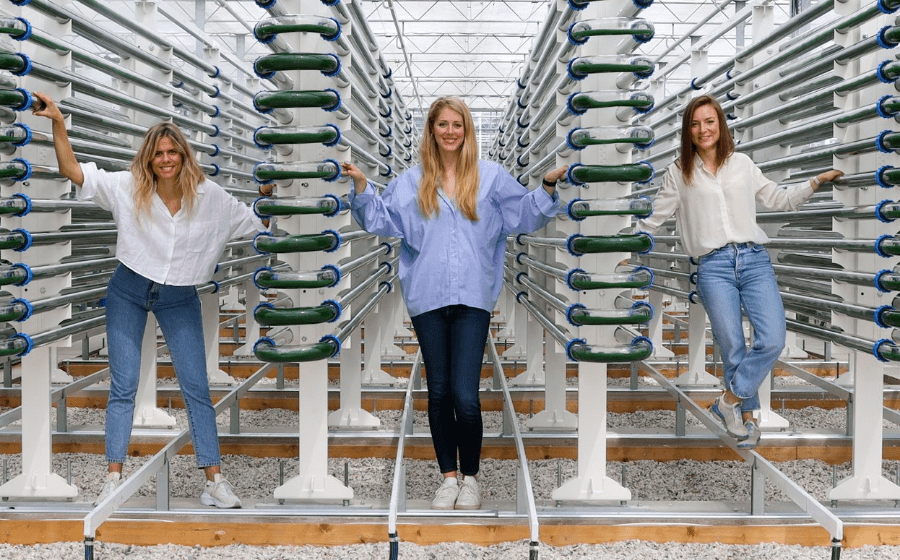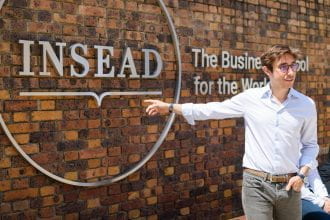
FUL Foods co-founders, from left: Cristina Prat MBA’19D (CTO), Julia Streuli MBA’19D (CEO), Sara Guaglio MBA’19D (COO)
With Spirulina, FUL Foods is doing more for the environment with less.
In 2019, Julia Streuli MBA’19D, Sara Guaglio MBA’19D and Cristina Prat MBA’19D saw a big opportunity in one of the tiniest organisms on earth: a type of blue-green microalgae called Spirulina.
The INSEAD students came across Spirulina while researching “alt proteins” in the sustainable food sector. This superfood, they learned, was more than just nutritious. It could be grown in a highly resource-efficient manner, converting CO2 into oxygen, nitrogen and nutrients — and had done so for billions of years. It could also be produced with limited freshwater and without the use of arable land or fertilisers and pesticides, unlike most plant-based proteins.
Spirulina, they thought, could be the crucial component they needed to achieve their shared vision: starting a company that proactively addressed climate threats posed by the food system. Those instincts were right. One year later, they co-founded FUL Foods, a food and beverage company that uses Spirulina to improve human and planetary health.
Drinking blue to go green
Based in the Netherlands, FUL Foods is a “climate active” business, according to the co-founders. “Climate active is less about mitigating or offsetting the adverse effects of a product or company, and more about building our company’s purpose, processes and products to benefit the climate,” explains Streuli, who serves as CEO. “We aim to go beyond ‘neutral’ and do more good than harm through the way we operate our business.”
To produce Spirulina, FUL Foods employs a closed-loop system that converts more CO2 into oxygen and nutrients than it emits. It also sources that CO2 from other industrial waste streams. “We call this CO2 recycling because our superfood is grown using CO2 that would have otherwise been emitted into the atmosphere by other processes,” says Guaglio, FUL Foods’ COO. Water used during production is also collected and reutilised after Spirulina is harvested. In parallel, the team is working on a project funded by the Dutch government to build a fully circular system.
FUL Food’s flagship product is “Revive,” a bubbly, blue-tinged tonic that is available in three flavours: Lime & Mint, Lemon & Ginger and White Peach. It contains the company’s trademarked superfood ingredient — FUL® — which is produced through a proprietary biorefinery of Spirulina and addresses key issues around taste, solubility, stability and bio assimilation. (FUL Foods has filed a patent for this method.) Currently, Revive is available in the Netherlands, Belgium and the UK; in the next two years, it is slated to reach North America, Asia and other European countries.
The FUL Foods team is interested in business opportunities that go beyond beverages, however. “What makes us different is that we are involved in both consumer goods and the scientific community,” says Prat, FUL Foods’ CTO. “We have the potential to create innovations with a substance that, up until now, has only been available in the supplement aisle of the grocery store.”
![[FINAL1] FUL-LifestyleCrop (1) (1)](https://alumnimagazine.insead.edu/files/2021/11/FINAL1-FUL-LifestyleCrop-1-1.jpg)
Finding synergy across differences
In their first few weeks at INSEAD, Streuli, Guaglio and Prat met serendipitously in the Singapore campus cafeteria. Over a casual lunch, they talked about their different backgrounds; Streuli was from the social impact and technology space, Guaglio was involved in family business manufacturing and Prat came from corporate oil and gas. They also discovered their shared passion for employing business tools to address climate problems.
Through more conversations, “we realised that our skillsets, and the way we thought about different challenges or opportunities, were complementary,” says Streuli. “These differences and nuances could help us produce something that was much better than the sum of our parts.”
Shortly thereafter, the trio teamed up for a summer-long research project on sustainability in business. Their research took them to Singapore, Paris, London, Amsterdam, Berlin and Milan for more than 100 interviews with entrepreneurs, investors and policymakers. With funding from the Hoffmann Global Institute for Business and Society, they extended their research for the INSEAD Summer Startup Tour to explore innovations addressing climate change — including those in the food sector — with experts from the alumni community. This led them to microalgae as a sustainable food source.
Interested in exploring microalgae further, they approached Professor Andre Calmon to work on an Independent Study Project. Calmon challenged the team to think bigger and explore whether they could design an entire supply chain for a food product that had a negative carbon balance, recognising that microalgae were efficient at capturing CO2. They discovered that it was, indeed, possible.
By autumn, they were refining their business idea in preparation for the INSEAD Venture Competition. This was a pivotal point for FUL Foods, Streuli says, because it allowed the co-founders to bring together their learnings and connections to create an actual business plan. At the competition, they beat more than 80 teams to take home the top prize.
Under the microscope
Today, in between producing Revive at a brewery in Netherlands, expanding distribution throughout Europe and working with a French facility to perform the biorefinery, the FUL Foods team has hired scientists focused on research and development for new products. They are exploring a variety of applications for microalgae.
“Right now, the beverage is a way to reach our target consumer in an efficient way,” explains Prat. “But what we are also after is a process through which we can access many valuable components that can be extracted from the microalgae biomass — not one but multiple fractions — that could be used in consumer foods or commercialised for B2B partners.”
As they investigate these opportunities, the co-founders plan to stay in close contact with INSEAD. Says Guaglio, “There could be no better community than INSEAD’s to collectively pursue this critical climate, social and business opportunity.”


